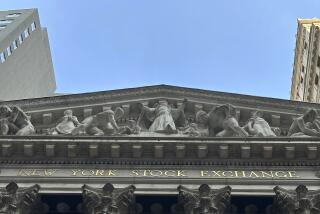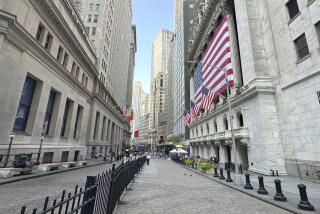Rothschild Reports Loss as Brokerages Assess Crash Toll
- Share via
NEW YORK — The gloom on Wall Street mounted Monday as L. F. Rothschild & Co. estimated its trading losses from the stock market crash at a huge $44 million and market analysts predicted that the losses suffered by the nation’s stock brokerages will far outweigh the windfall in commissions from the past week’s trading flood.
“The increase in commissions is not even coming close to offsetting the hits these firms are taking,” said Perrin Long, a veteran brokerage analyst for Lipper Analytical in New York.
The first public support for his assessment--widely shared by other securities analysts--came late Monday when Rothschild became the first securities firm to publicly gauge the toll from last week’s market meltdown. It was worse than expected.
Rothschild, No. 22 among the nation’s securities firms in terms of capital, reported October trading losses of about $44 million--primarily in arbitrage, one of the businesses that analysts say was hardest hit by the crash.
“Isn’t it interesting that arbitrage was invented as a way to protect your profit and it seems to have worked the other way this time around?” noted Martha Cyd, a spokeswoman for the New York Stock Exchange. Arbitrage departments place bets on the outcome of takeover battles.
Rothschild also said it would cut back its activities in the public finance, municipal bond trading and sales businesses and would lay off 150 employees in those areas.
“By removing ourselves from these businesses, we will be able to concentrate our capital and our people on our traditional areas of strength in the equity business; in fixed income including U.S. government, corporate, high-yield and mortgage bonds; investment banking and arbitrage,” Robert Schoenthal, co-chief executive, said in a statement.)
To put the Rothschild loss into perspective, the firm’s trading revenue for the three-month period ended Sept. 30 totaled less than $30 million, and its brokerage commissions for the same quarter were $21.5 million. If the market’s volume were to continue at its current pace and Rothschild’s brokerage business rose accordingly, its commission revenue for the next three months would still fall short of the single-month trading loss.
“Commissions never have been of a size that paid the rent. I’m sure no firm is counting on them now,” said Brenda Davis McCoy, a brokerage analyst for the investment firm Paine Webber.
Actually, commissions did pay the rent for some brokerages before the business was deregulated on May Day, 1975.
Before then, brokerage commission rates were dictated by the government and were lucrative enough--about 25 cents per share--to account for about 55% of the average brokerage’s revenue.
But on May 1, 1975, the rates were opened to competition, and within two months they had fallen to 40% of their earlier levels, according to Samuel L. Hayes III, a finance professor at Harvard Business School and a student of investment-firm history.
From that point, commissions steadily fell. As of last year, commissions accounted for only 21% of the average brokerage firm’s revenue, according to George R. Monahan, assistant research director for the Securities Industry Assn.
Even the big retail brokerage houses, which deal with ordinary investors who pay considerably higher commissions than do institutional investors--24 cents to 26 cents per share, on average, versus 6 cents to a dime--only hope that the extra commissions of the past few days offset the additional overhead.
“Not even in their wildest dreams do they expect the extra commissions to offset their losses from this debacle,” said one securities analyst who has met with several brokerage executives since the market tumble began.
Thus, even though many firms report that commission income is running two to three times its usual pace, many brokerage analysts said Monday that they expect to reduce their earnings estimates for the publicly traded brokerage stocks.
Michael W. Blumstein, a First Boston analyst, has already sliced his estimate for Bear Stearns’ current quarter to 25 cents a share from 55 cents. And Long, McCoy and Drexel Burnham Lambert analyst John Keefe all expect to similarly downgrade various brokerage stocks.
McCoy said she will reserve judgment until the results of last Monday’s and Tuesday’s tremendous trading activity have been “settled” on the brokerage firms’ books--a process that is now half finished.
Brokerages are required to make sure that each seller’s records jibe with the buyer’s records within five days of the transaction. That settlement process went smoothly on Monday and with no more discrepancies than usual, according to First Boston, Paine Webber and several other large firms informally polled. But the official results won’t be in until today at the earliest.
Analysts, in assessing the outlook for the brokerages, also point out that the brokerage stocks have been among the biggest casualties of Wall Street’s plunge--an indication that investors expect serious damage, especially in the wake of the staggering bond trading losses that many of the firms took in the second quarter. Merrill Lynch, for example, suffered a record $275-million pretax trading loss.
Also much on Wall Street’s mind is the prospects for long-term damage.
“You can pretty well count on a lot of investors waiting on the sidelines for months--maybe years--to come,” said Eugene D. Peroni, a market analyst with the Philadelphia investment firm Janney Montgomery Scott. “And then the real suffering will begin.”
More to Read
Inside the business of entertainment
The Wide Shot brings you news, analysis and insights on everything from streaming wars to production — and what it all means for the future.
You may occasionally receive promotional content from the Los Angeles Times.










